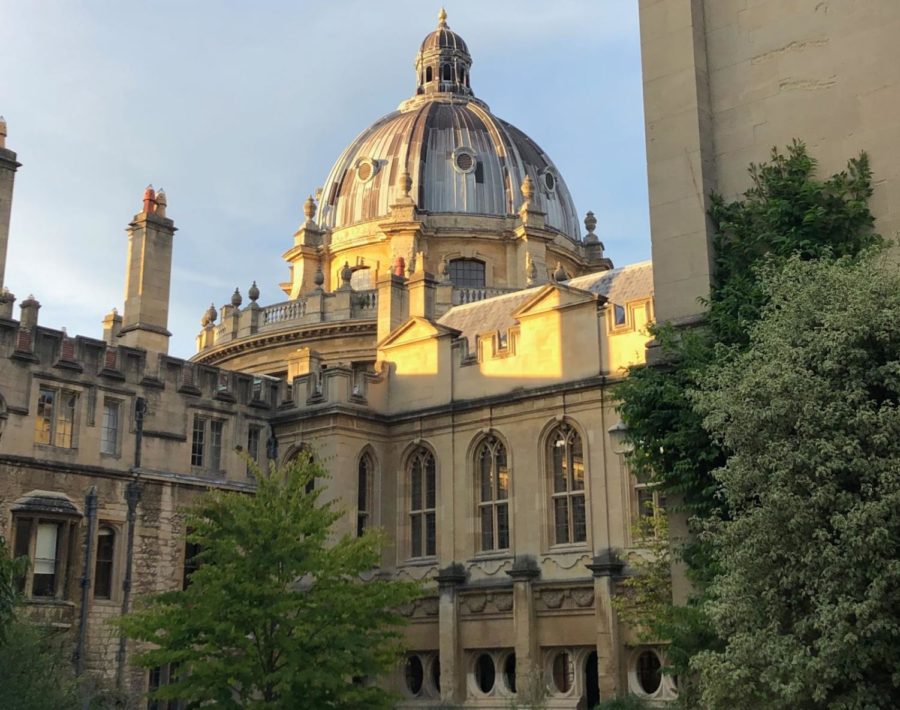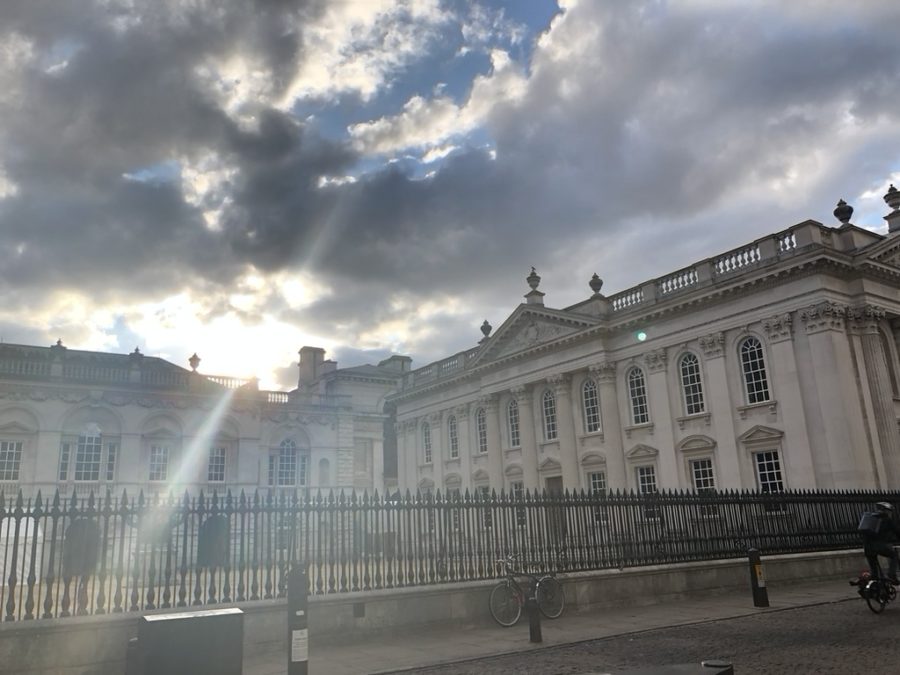Are Summer Study Abroad Programs Worth the Trip?
In the sea of summer opportunities for high school students, studying abroad provides a unique opportunity for education, accomplishment, and adventure.
Within the secluded pathways and community of Brasenose College (Oxford), I woke up to beautiful skies, architecture, and memories to be made.
I spent the summer of 2022 in ivy-covered buildings three times the age of my home country. Learning from and with incredible minds, and attempting to appreciate the “wonders” of British cooking, I found a home at Oxford and Cambridge Universities through a summer program with Immerse Education.
I learned how to write an elegy, incorporate Norse mythology into my own creative fiction, hold a conference on climate change with fellow students all over the world, and advocate for myself in leadership settings. Navigating unfamiliar situations, I also managed to work the strange intricacies of British laundry machines, complete grocery shopping by myself, and grasp a basic understanding of the British A-level system of education that differs so greatly from our own — all of that on an international data plan that barred any use of Google Maps.
My Experience
After spending much of my winter and spring confused during the 2021-2022 academic year conflicted about summer plans — summer camp, college course, internship, research fellowship, or service learning — I stumbled upon a once in a lifetime opportunity in a navy and white Instagram ad for summer school at Oxford. I was thrilled to find an opportunity that encapsulated my fascination of foreign cultures, my drive to learn, and my need for tangible academic achievement.
Following a six hour flight to Heathrow Airport, I dragged my bulky, overweight suitcase to the car and began five unforgettable weeks. I checked into Brasenose College, a picturesque enclave in the heart of Oxford.
Racked with nerves, I fretted over culture barriers, making friends, meeting the intelligence caliber of the program, and even the style of my clothing. Note for the future: England is not a sweatpants friendly nation. Soon, however, my nerves melted away, as I played Uno in a small tent and exchanged Instagram handles with newly made friends who came from the other side of the globe.
The following morning, I went to my first lesson of the Creative Writing course, taught by Dr. George Manning, a lecturer in Medieval English. He not only seamlessly engaged students with a variety of English proficiency with university caliber writing but also created stimulating discussions that carried us far past our class time.
Dr. Manning said, “What I was delivering in the first week was basically a condensed form of what I would deliver to my first year undergraduates. Of course, we’re working in translation [the Oxford English department actually teaches students to read and write Old and Middle English]. So obviously when you come to university and study it, you’ll be learning the old English language in addition. I would say, if you had done that course and then pitched up in my classes, you’d be in a pretty good position.”
Over the next two weeks, I bore witness to a ridiculous amount of Harry Potter merchandising stores, a concerning amount of sushi, and some of the best writing I have ever read, from an ode to gelato to a visceral portrayal of the sacking of Lindisfarne. I also experienced a record breaking heat wave, which I had to convert to Fahrenheit to even remotely understand.
I then continued to Cambridge, where I met more incredible people and learned how to advocate for myself in a “Future Female Leaders” course, in which a group of female and nonbinary students delivered elevator pitches, engaged in voracious debates, simulated board meetings, and worked on both team-building and public speaking. We painted in lush gardens, sang obnoxiously loud karaoke, and forced recommendations of our favorite novels onto our friends.
Walking amongst cobblestone streets, laden with history and references to favorite childhood stories, I learned what it meant to study, learn, and thrive.
General Benefits
Speaking purely from a résumé standpoint, studying abroad – even if only for a couple weeks – can demonstrate independence, initiative, and willingness to take meaningful risks. However, the real takeaway comes from a greater international understanding of culture, the ability to meet other passionate people, and the chance to study in depth.
Manning contributed, “I also think it counts a lot for having people present. People actually want to learn, people actually care about the subject. You wanted to be there and wanted to get involved.”
The work may not be easy, but working in such depth (at least four hours of study, discussion, and learning per day) teaches you many lessons.
Karl Keely, the Academic Manager at Immerse Education (the international summer school program that I attended), added, “Many of the students are very driven. They are coming with a firm idea of what they want to do, who they want to be, and what they want to get out of the program. They will work very hard. They are typically very inquisitive, questioning what they’re learning, about others’ backgrounds, and about what it’s like to study [at Oxford].”
The small group atmosphere of these programs – my class was composed of eleven people – allows for in-depth discussion, enhanced connections and friendships, along with one-on-one attention from educators. Furthermore, since you are not taking multiple intensive courses but instead choosing a major subject of personal interest, you have the time and opportunity to devote to study and personal development.
Samarah Kanji, a Canadian student in my Oxford program pursuing the medical track, reflected, “The most meaningful aspect goes beyond the academic opportunity… meeting so many other kids from all over the world was a learning opportunity, and I have now made some really good friends as well. While our geographic regions may be very different, there is always something that people have in common.”
Each attendee is just as passionate as you, leaving you with meaningful discussion and reflection. Furthermore, the variety in climate and culture promotes new understanding of things sometimes taken for granted.
Sam Schwarting, a fellow Future Female Leaders student with me at Cambridge, thoughtfully remarked, “I love meeting people from different places or backgrounds and asking them questions about their culture; it’s so interesting to see how many different ways humans have developed. There were some culture shocks, like learning that one of the girls from Korea hadn’t heard of ABBA.”
Annabelle Rossi, another Creative Writing student and one of the few fellow Americans at Oxford with me, said, “It was truly incredible to have the opportunity to expose myself to so many different cultures. I was so impressed by what my new friends told me about their countries, and I was able to broaden my horizons. But even as I was enjoying the food, music, and architecture of another country, I was missing those of my own. I have learnt a new appreciation for the corner of the world that I live in. I felt proud to tell others about what makes my home special, and I’m more aware of it now.”
And there is nothing more interesting than watching a conversation transpire between Argentinians speaking Spanish and Brazilians speaking Portuguese while completely understanding each other or debating the merit of the American tax system with someone who lives halfway across the world. Some things, you may find, are just universal, like Taylor Swift, mid-2000s Disney Channel, perpetually bad chainstore coffee, and the wonderful aroma of bookshops.
Types of International Summer Programs
What I attended is only one of the many types of summer programs for high school students available abroad with varying lengths and immersions.
You can travel, partaking in teen tours: visiting a multitude of cities, visiting museums, gauging cultures, and attending local activities. These tours are typical in Europe but have begun to expand to East Africa, Latin America, and Southeast Asia, among other locations.
You can participate in service learning: traveling to places where you can give back, be it through providing education, engaging in environmental action, or constructing buildings.
You can engage in language immersion: learning a foreign language in its place of origin/familiarity. This could mean French in France, Spanish in Costa Rica, and the like.
You can do athletic programs: not only do you immerse yourself in culture, but you live through the sports and training of another country.
Finally, you can take educational courses: learn pretty much any possible subject in a far away, engaging location with people from around the world.
These multitudes of options may seem overwhelming, but their benefits are not mutually exclusive; by virtue of being in another country, one still gains access to key aspects of the nation’s culture, cuisine, and history, even without set activities.
Reflecting on Various Programs
An experience of this caliber can shape your future, cement career aspirations, and enhance your ability to interact with likeminded people from across the planet, not to mention provide an excellent résumé boost.
Antonia Duffey ’24 spent the summer of 2021 in Madrid studying molecular medicine. “I found it a really nice introduction to more specific aspects of the medical field. Furthermore, being isolated from people I knew was really good for making connections, and it was fun to travel with a bunch of people my age,” Duffey said.
It is also a chance to leave your comfort zone, learn in entirely new ways, and engage with vastly different people. As Keely said, “What is good with having people from these different cultures is getting to understand yourself, how others learn, [and] how to pick up good habits [and] skills you were not aware of before. You come back to school with these new ideas percolating in your brain…From a social side, you get to be in a completely new group of people for a few weeks, which is exactly what will happen when you go to college. Since there are all new people, you develop these interpersonal skills that are really necessary [to develop].”
Rossi added, “I’d have to say that the most interesting thing I learned in class is my new creative perspective. Many of the projects we completed during the course were done in class with a very limiting time restraint. At first, I groaned and griped because I wanted more time. But later, I realized that this was really good for my perfectionistic tendencies. I was forced to let my very ‘un-perfect’ work be good enough to turn in. I was suddenly unhindered by any hope that my work was going to turn out well. I just wrote.”
Furthermore, as the college process and applications approach, these types of programs can help you not only reflect on how you learn best, the types of environments in which you feel most comfortable, and how to engage with people who come from vastly different backgrounds. Kanji added, “As a senior, I believe [this experience] helped me narrow down my choices of where I wanted to go, but also it helped me become more open minded during this process.”
Keely also attested, “Because our content is based on Oxford and Cambridge programs themselves, the goal is to give you a taste of what it would be like there, to give you a sense of the level of where you need to be in two-three years from now.” If you want to improve college readiness, there is nothing quite like learning from University professors in a professional setting.
That said, living far away can be difficult, navigating a multi-hour time difference when trying to connect with family and friends at home, a range of international data plans that limit communication and cellular usage, along with occasional feelings of isolation.
Rossi reflected, “This experience was one of the biggest learning curves of my life. I learned so much about myself. For example, I’m a little less outgoing than I thought, but I can still do things that scare me. I was also able to grow my skills as a writer and get out of my ‘essay writing comfort zone.’ However, I think the most meaningful part of my experience was the appreciation I gained for the things and people I take for granted. I had moments when I felt very homesick, something that I didn’t believe was going to happen to me.”
Affording a Program
When choosing a program, it is important to consider location, duration of program, price, group size and composition, focus of the program, and reputation of the organization. Programs may last a week or two or even upwards of a month. You could have a small group experience or be surrounded by many people.
Of course, it goes without saying many of these programs are undoubtedly expensive. From plane tickets to courses to food and drink, the price tag can be daunting, especially for lower income families. Luckily, many of these programs include financial assistance and donations.
At Immerse Education, the program in which I participated, there is an active scholarship program. From September 7th to January 4th, they initiate an essay writing competition geared towards students from ages thirteen to eighteen from across the world. The topics correlate to the courses offered, which include Engineering, Law, International Relations, Creative Writing and Medicine, to name a few. There is no entry fee to apply, the essays are sent to independent, unaffiliated graders, and the top ten winners receive a full scholarship. Runners up can gain partial scholarships up to seventy percent off of the course price, as well.
Keely contributed, “Immerse is a high end product. It is not cheap. It does, because of the price (which comes with the quality of tutors, accommodations, activities), eliminate big groups of people from having the opportunity to do it. If we can do something to give them this experience, if we can give them this discount, we do.”
Alternative scholarships can be found at a variety of programs, including here and here.
Each summer opportunity and program comes with its own merits and deficits, but I can say with absolute certainty that I have learned and grown because of this experience.
As I scroll through reels sent in our Immerse group chats, I am met with much love and nostalgia, flashing back to the days of impulsive book purchases, bikes speeding past, and the word petrichor – which means the smell of rain, taught to me by a Czech friend in the writing of a Middle English poem and further apropos to the English climate — a summer of learning, laughing, and creating.
As Keely stated, “What is good with having people from these different cultures is getting to understand yourself, how others learn, [and] how to pick up good habits [and] skills you were not aware of before. You come back to school with these new ideas percolating in your brain…From a social side, you get to be in a completely new group of people for a few weeks, which is exactly what will happen when you go to college.”
Hallel Abrams Gerber is an Editor-in-Chief for ‘The Science Survey,’ using her writing to represent a myriad of social issues and innovations, bolster...












